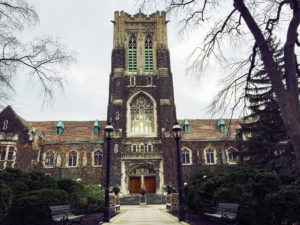
The Education Policy Committee is revaulating Lehigh’s President’s Scholars Program. One of their goals is to clarify its guidelines. (Ryan Bonshack/B&W Staff)
The Educational Policy Committee met Wednesday in the University Center to discuss the President’s Scholars Program and general education class requirements and guidelines.
The committee is comprised of faculty and staff members, three undergraduate students representing each college and a graduate student representing the College of Education.
The first item on the committee’s agenda was to reevaluate the true purpose of Lehigh’s President’s Scholars Program and clarify its guidelines.
The program awards a free fifth year of study to students who complete at least seven full-time academic-year terms and maintain at least a 3.75 cumulative GPA.
According to the President’s Scholars Program website, the scholarship can be used to earn a second undergraduate degree, pursue a master’s degree or undertake a special project. To be eligible for this scholarship, students must have earned a minimum of 92 credits at Lehigh. For transfer students, 60 of their last 75 college credits must come from Lehigh for them to qualify.
Ashley C. Baker, an associate registrar, was recently put in charge of the President’s Scholars Program. Baker said she wanted to clarify the language on the President’s Scholars website.
The committee discussed the current wording and decided it should include the original intent behind the scholarship program. Baker also asked the committee a series of questions, including whether or not the scholarship could be used for a sixth or seventh year of study and if the student should graduate to be eligible for the program.
Committee members decided that students must use the scholarship for a fifth year at Lehigh. They also determined that eligible students should finish their degree requirements but do not need to graduate.
The committee also discussed additional purposes of the scholarship and decided that students do not need to use the scholarship to pursue an additional degree. Instead, they can use their free year of study to take courses for educational enrichment.
The committee agreed to revisit the President’s Scholars Program discussion at another meeting in the future.
“This is not a perfect program,” said Jennifer Jensen, the deputy provost for academic affairs.
The committee also spoke about the Middle States Commission on Higher Education, a volunteer, non-governmental association serving institutions of higher education in select states, including Pennsylvania.
Jensen presented to the commission and told the committee that Lehigh needs to improve its definition of general education class requirements.
She introduced three general education models that have been used at other schools. Jensen said the commission’s biggest complaint was that Lehigh has a good reputation for rigor, but it has not properly defined the learning outcomes of general education courses. Committee members will further discuss these models at a future meeting.
Joey Kawash, ’19, has been on the committee for two semesters and represents the College of Business and Economics. He said he likes participating on the committee because he is passionate about education.
“We don’t get votes, but our perspectives are valued,” Kawash said.
Juan Shiraishi, ’18, joined the committee this semester and represents the College of Engineering. Shiraishi said he enjoys participating in discussions that affect students.
At the conclusion of the meeting, Anne Anderson, a finance professor and the chair of the committee, informed committee members that the Faculty Senate will decide whether or not to dissolve the Education Policy Committee.
“I personally think you’ll at least have the educational policy committee for another year,” Anderson said.
The committee will hold one more meeting this semester on Nov. 29. A representative from Lehigh’s forthcoming College of Health will be present to answer questions.





Comment policy
Comments posted to The Brown and White website are reviewed by a moderator before being approved. Incendiary speech or harassing language, including comments targeted at individuals, may be deemed unacceptable and not published. Spam and other soliciting will also be declined.
The Brown and White also reserves the right to not publish entirely anonymous comments.